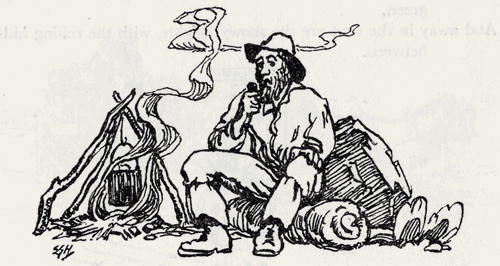
Just as Irish writers and poets made a substantial contribution in the Old World, they quickly added to the literary traditions of New Zealand. One of the earliest poets with an Irish background was David McKee Wright, originally from County Derry and arriving in New Zealand in 1887. After working on sheep stations and as a rabbiter in the South Island, Wright began to produce rollicking verse capturing the masculine language and values of the outback. This poem, ‘While the billy boils’ (and the accompanying illustration shown here), appeared in Station ballads and other verses (1897):
The speargrass crackles under the billy and overhead is the winter sun;
There’s snow on the hills, there’s frost in the gully, that reminds me of things that I’ve seen and done,
Of blokes that I knew, and mates that I’ve worked with, and the sprees that we had in the days gone by;
And a mist comes up from my heart to my eyelids, I feel fair sick and I wonder why.
There is coves and coves! Some I liked partic’lar, and some I would sooner I never knowed,
But a bloke can’t choose the chaps that he’s thrown with in the harvest paddock or here in the road.
There was chaps from the other side that I shore with that I’d like to have taken along for mates,
But we said, ‘So long!’ and we laughed and parted for good and all at the station gates.
I mind the time when the snow was drifting and Billy and me was out for the night,
We lay in the lee of a rock, and waited, hungry and cold, for the morning light.
Then he went one way and I the other – we’d been like brothers for half a year;
He said: ‘I’ll see you again in town, mate, and we’ll blow the froth off a pint of beer.’
He went to a job on the plain he knowed of and I went poisoning out at the back,
And I missed him somehow – for all my looking I never could knock across his track.
The same with Harry, the bloke I worked with, the time I was over upon the Coast,
He went for a fly-round over to Sydney, to stay for a fortnight – a month at most!
He never came back, and he never wrote me – I wonder how blokes like him forget;
We had been where no one had been before us, we had starved for days in the cold and wet;
We had sunk a hundred holes that was duffers, till at last we came on a fairish patch,
An’ we worked in rags in the dead of winter while the ice-bars hung from the frozen thatch.
Yes, them was two, and I can’t help mind them – good mates as ever a joker had;
But there’s plenty more as I’d like to be with, for half of the blokes on the road is bad.
It sets me a-thinking, the world seems wider, for all we fancy it’s middling small,
When a chap like me makes friends in plenty and they slip away and he loses them all.
The speargrass crackles under the billy and overhead is the winter sun,
There’s snow on the hills, there’s frost in the gully, and, Oh, the things that I’ve seen and done,
The blokes that I’ve knowed and the mates that I’ve worked with, and the sprees that we had in the days gone by;
But I somehow fancy we’ll all be pen-mates on the day when they call the Roll of the Sky.
Te whakamahi i tēnei tūemi
Te Ara - The Encyclopedia of New Zealand
Reference:
A. E. Woodhouse, New Zealand farm and station verse. Wellington: Whitcombe & Tombs, 1950, pp. 38–39.
This item has been provided for private study purposes (such as school projects, family and local history research) and any published reproduction (print or electronic) may infringe copyright law. It is the responsibility of the user of any material to obtain clearance from the copyright holder.






Tāpiritia te tākupu hou